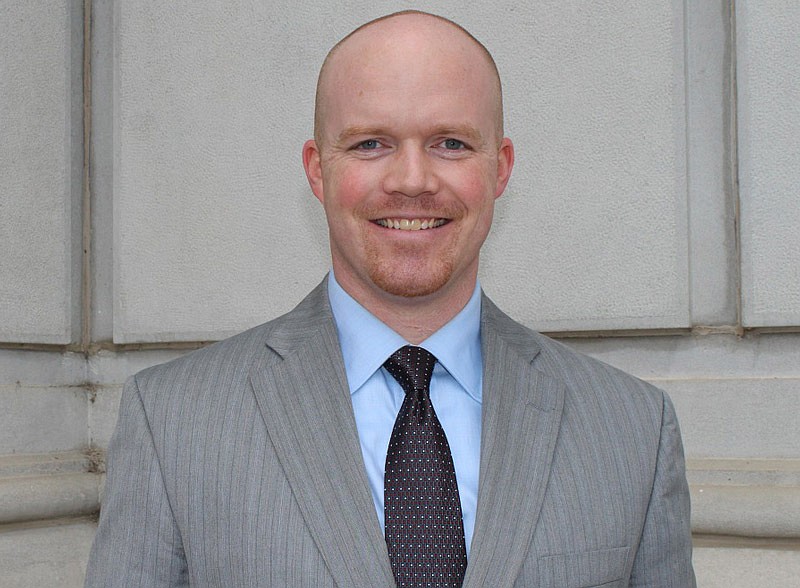State Rep. Travis Fitzwater, R-Holts Summit, gave and heard testimony Wednesday on his House Bill 1623 that seeks to expand and structure computer science opportunities for middle and high school students
For the most part, testimony from industry and education leaders was in the bill's favor.
Fitzwater presented his bill to the House's Workforce Development Committee, which he vice-chairs. He presented alongside Chairwoman Jeanie Lauer, R-Blue Springs, whose HB 1457 is similar; Fitzwater said they intend to combine efforts and bring one bill back to the committee next week.
His bill would principally do five things:
Have the Department of Elementary and Secondary Education develop a high school graduation policy by July 1, 2019, "that allows a student to fulfill one unit of academic credit with a district-approved computer science course for any math, science or practical arts unit" required for graduation.
Have the State Board of Education convene a work group by July 1, 2019, to "develop and recommend academic performance standards relating to computer science" that would be adopted and implemented beginning with the 2020-21 school year.
Create a State Board of Education-run "Computer Science Education Fund" that would disburse grants to support computer science-related teacher professional development programs.
Create an online-based curriculum "STEM Career Awareness Program" to introduce all public, private and home-schooled students in grades six through eight to science, technology, engineering and math careers. DESE would solicit proposals by Jan. 1, 2019, and select a provider of the curriculum or have chosen a third-party nonprofit to do that work.
Create a "STEM Career Awareness Program Fund" to be implemented beginning with the 2019-20 school year to support the aforementioned online curriculum.
Appropriations from the General Assembly and receipts from private parties would support the two funds, and the state treasurer would be the custodian of the funds.
Fitzwater has had a bill like this pass the House before - HB 248 didn't make it through the Senate last year - but the computer science portions of his current bill are new.
He said the computer science piece of his bill has been implemented in about 35 states.
The state currently requires high school students complete three credits of math to graduate. "This (bill) would allow to replace one of those (credits) or add a fourth for graduation," Fitzwater said of giving students the option to take computer science in lieu of a math credit.
The only opposition to the bill so far, though, has been about that approach. Lauer noted DESE is concerned giving students the option to opt out of a math credit will interfere with them taking remedial math necessary to get into college.
Representatives from the Missouri School Counselor Association and Missouri Association for College Admissions Counseling testified against the bill Wednesday.
Shari Sevier and Rob Lundien said because public and private Missouri colleges require three units of math and science for students to gain admission, they worry the substitution of one of those credits for computer science will derail students' college plans.
Sevier is director of advocacy, legislation and leadership for MSCA, and Lundien is a high school counselor from the Kansas City area who represented MOACAC. Both said they would support the bill if computer science was required to be offered as a core elective and not as a substitution for other academic credits.
"This is an incredible opportunity for kids to replace a credit in high school with maybe something that's a little more appealing, depending on who you are - and even more so, that has a real need in the marketplace," Fitzwater told the committee before Sevier and Lundien testified.
Fitzwater said large employers in the state like Boeing Co. and Cerner are "begging" for a computer-literate workforce, and he has had discussions with such companies.
Almost all of the testimony about the bill Wednesday was in support of it, including from representatives of the Missouri State Teachers Association, Missouri National Education Association, Missouri Chamber of Commerce, Missouri Biotechnology Association, Southwest Baptist University, Boeing and Kansas City economic associations.
Fitzwater said after the hearing, it is important to work to make sure bills don't have unintended consequences and that he will work on "simple fixes" in the language to hopefully reach some kind of agreement with those in opposition.
He also hopes colleges and universities in the state decide to start accepting computer science on the same level as math and traditional sciences.
"We have a lot of discussion to go on this bill and the dynamics of it, but I think it's important that this moves forward," Fitzwater told the committee.

